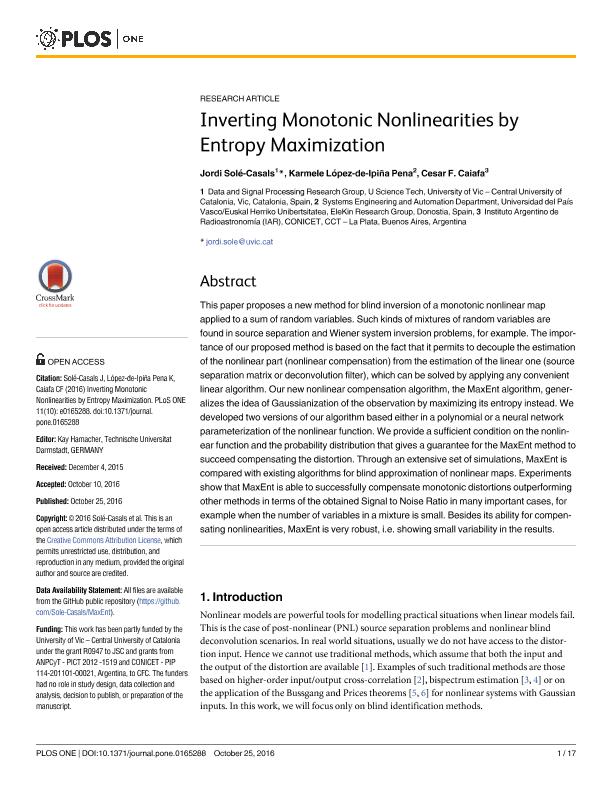Mostrar el registro sencillo del ítem
dc.contributor.author
Sole Casals, Jordi
dc.contributor.author
Pena, Karmele López de Ipiña
dc.contributor.author
Caiafa, César Federico

dc.date.available
2017-09-26T15:32:18Z
dc.date.issued
2016-10
dc.identifier.citation
Sole Casals, Jordi; Pena, Karmele López de Ipiña; Caiafa, César Federico; Inverting monotonic nonlinearities by entropy maximization; Public Library of Science; Plos One; 11; 10; 10-2016; 1-17; e0165288
dc.identifier.issn
1932-6203
dc.identifier.uri
http://hdl.handle.net/11336/25112
dc.description.abstract
This paper proposes a new method for blind inversion of a monotonic nonlinear map applied to a sum of random variables. Such kinds of mixtures of random variables are found in source separation and Wiener system inversion problems, for example. The importance of our proposed method is based on the fact that it permits to decouple the estimation of the nonlinear part (nonlinear compensation) from the estimation of the linear one (source separation matrix or deconvolution filter), which can be solved by applying any convenient linear algorithm. Our new nonlinear compensation algorithm, the MaxEnt algorithm, generalizes the idea of Gaussianization of the observation by maximizing its entropy instead. We developed two versions of our algorithm based either in a polynomial or a neural network parameterization of the nonlinear function. We provide a sufficient condition on the nonlinear function and the probability distribution that gives a guarantee for the MaxEnt method to succeed compensating the distortion. Through an extensive set of simulations, MaxEnt is compared with existing algorithms for blind approximation of nonlinear maps. Experiments show that MaxEnt is able to successfully compensate monotonic distortions outperforming other methods in terms of the obtained Signal to NoiseRatio in many important cases, for example when the number of variables in a mixture is small. Besides its ability for compensating nonlinearities, MaxEnt is very robust, i.e. showing small variability in the results.
dc.format
application/pdf
dc.language.iso
eng
dc.publisher
Public Library of Science

dc.rights
info:eu-repo/semantics/openAccess
dc.rights.uri
https://creativecommons.org/licenses/by-nc-sa/2.5/ar/
dc.subject
Maximum Entropy
dc.subject
Information Theory
dc.subject
Blind Inversion
dc.subject
Neural Networks
dc.subject
Nonlinear Systems
dc.subject.classification
Otras Ciencias de la Computación e Información

dc.subject.classification
Ciencias de la Computación e Información

dc.subject.classification
CIENCIAS NATURALES Y EXACTAS

dc.title
Inverting monotonic nonlinearities by entropy maximization
dc.type
info:eu-repo/semantics/article
dc.type
info:ar-repo/semantics/artículo
dc.type
info:eu-repo/semantics/publishedVersion
dc.date.updated
2017-09-01T18:27:21Z
dc.journal.volume
11
dc.journal.number
10
dc.journal.pagination
1-17; e0165288
dc.journal.pais
Estados Unidos

dc.journal.ciudad
San Francisco
dc.description.fil
Fil: Sole Casals, Jordi. Universidad de Vic; España
dc.description.fil
Fil: Pena, Karmele López de Ipiña. Universidad del País Vasco; España
dc.description.fil
Fil: Caiafa, César Federico. Provincia de Buenos Aires. Gobernación. Comision de Investigaciones Científicas. Instituto Argentino de Radioastronomía. Consejo Nacional de Investigaciones Científicas y Técnicas. Centro Científico Tecnológico Conicet - La Plata. Instituto Argentino de Radioastronomia; Argentina
dc.journal.title
Plos One

dc.relation.alternativeid
info:eu-repo/semantics/altIdentifier/doi/http://dx.doi.org/10.1371/journal.pone.0165288
dc.relation.alternativeid
info:eu-repo/semantics/altIdentifier/url/http://journals.plos.org/plosone/article?id=10.1371/journal.pone.0165288
Archivos asociados
